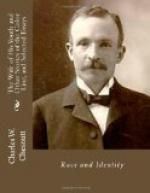“Grandison,” he said next morning, “I ’m going away for a day or two, but I shall leave you here. I shall lock up a hundred dollars in this drawer and give you the key. If you need any of it, use it and enjoy yourself,—spend it all if you like,—for this is probably the last chance you ’ll have for some time to be in a free State, and you ’d better enjoy your liberty while you may.”
When he came back a couple of days later and found the faithful Grandison at his post, and the hundred dollars intact, Dick felt seriously annoyed. His vexation was increased by the fact that he could not express his feelings adequately. He did not even scold Grandison; how could he, indeed, find fault with one who so sensibly recognized his true place in the economy of civilization, and kept it with such touching fidelity?
“I can’t say a thing to him,” groaned Dick. “He deserves a leather medal, made out of his own hide tanned. I reckon I ’ll write to father and let him know what a model servant he has given me.”
He wrote his father a letter which made the colonel swell with pride and pleasure. “I really think,” the colonel observed to one of his friends, “that Dick ought to have the nigger interviewed by the Boston papers, so that they may see how contented and happy our darkeys really are.”
Dick also wrote a long letter to Charity Lomax, in which he said, among many other things, that if she knew how hard he was working, and under what difficulties, to accomplish something serious for her sake, she would no longer keep him in suspense, but overwhelm him with love and admiration.
Having thus exhausted without result the more obvious methods of getting rid of Grandison, and diplomacy having also proved a failure, Dick was forced to consider more radical measures. Of course he might run away himself, and abandon Grandison, but this would be merely to leave him in the United States, where he was still a slave, and where, with his notions of loyalty, he would speedily be reclaimed. It was necessary, in order to accomplish the purpose of his trip to the North, to leave Grandison permanently in Canada, where he would be legally free.
“I might extend my trip to Canada,” he reflected, “but that would be too palpable. I have it! I ’ll visit Niagara Falls on the way home, and lose him on the Canada side. When he once realizes that he is actually free, I ’ll warrant that he ’ll stay.”
So the next day saw them westward bound, and in due course of time, by the somewhat slow conveyances of the period, they found themselves at Niagara. Dick walked and drove about the Falls for several days, taking Grandison along with him on most occasions. One morning they stood on the Canadian side, watching the wild whirl of the waters below them.
“Grandison,” said Dick, raising his voice above the roar of the cataract, “do you know where you are now?”
“I ’s wid you, Mars Dick; dat ’s all I keers.”




